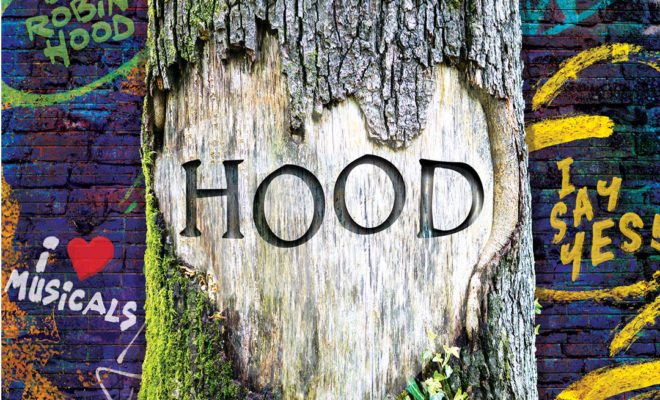
Feature
Leaning in to Joy: A Merry Band Debuts Hood at Asolo Rep
By Sylvia Whitman | Rehearsal Photos by Sophia Marquart | June 2022
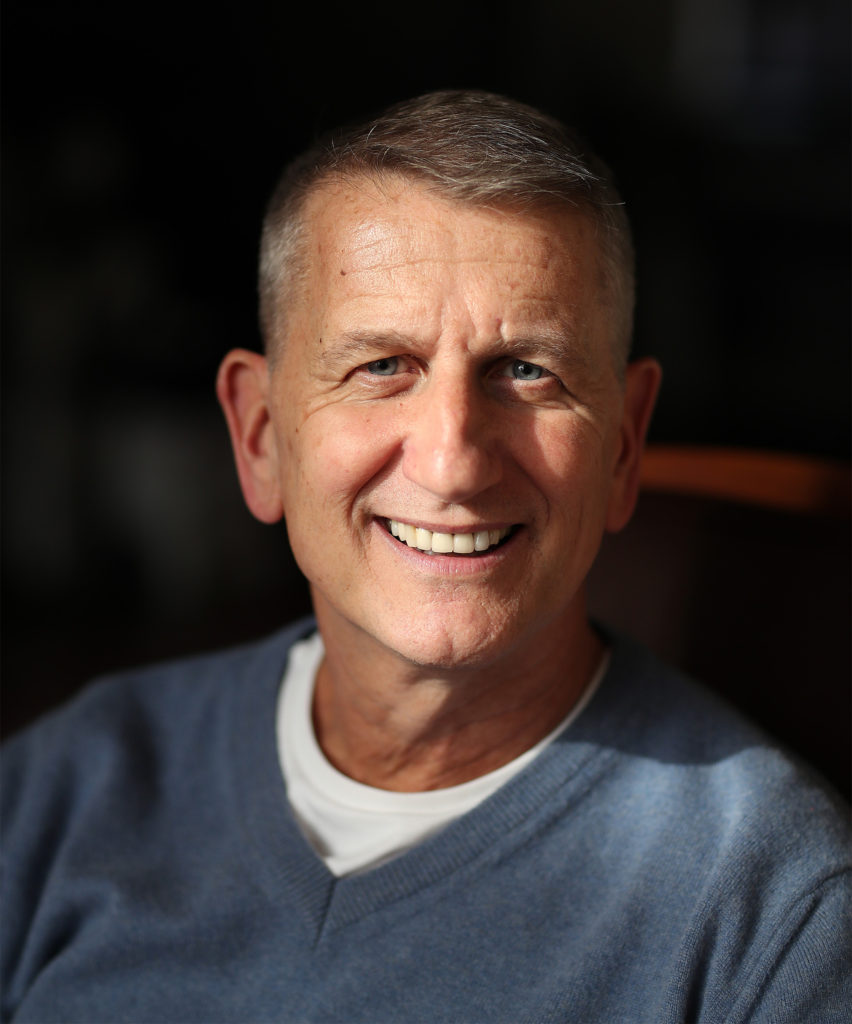
Some of theater’s big guns have gathered in Sarasota to launch Hood’s June run at Asolo Repertory Theatre. Prepare for some name dropping. Broadway producer Tom Kirdahy—of Ragtime, Anastasia, Hadestown, and much other fame—describes the comedic musical as a story about “a gloriously diverse company of young theater artists creating something new.” Along the way, they deliver a message about “seizing control over your own destiny and being your best possible self.” Broadway director Mark Brokaw—fresh off of the Tony-Award-nominated How I Learned to Drive—says Hood tries to “light a fire” under the audience. The cast within a cast confronts a world of haves and have-nots marked by disinformation and a sense of powerlessness—a world not unfamiliar to all of us who have survived these pandemic years. “What this story says is, everything you do, no matter how small, makes a difference.”
Strictly speaking, Dallas Theater Center claims the world premiere of Hood. Thinking the musical might have legs, Tony Award winner Douglas Carter Beane, who wrote the book, invited old friend and collaborator Kirdahy to Texas in the summer of 2017 to check out what Beane and lyricist/composer Lewis Flinn had created. Kirdahy and his producing partner Hunter Arnold were interested and later played matchmakers with Mark Brokaw.
That year, Kirdahy also moved from Key West to Sarasota with his late husband, four-time Tony-Award-winning playwright Terrence McNally. They were looking for easier access to water and health care and shorter flights to New York—and they loved the live arts. “All roads led to Sarasota,” Kirdahy says. So, as he was testing out a revised Hood, he approached Asolo Rep’s producing artistic director Michael Donald Edwards. In August 2019, the musical had a three-week workshop in Sarasota and made it onto the Asolo Rep schedule for production in April 2020.
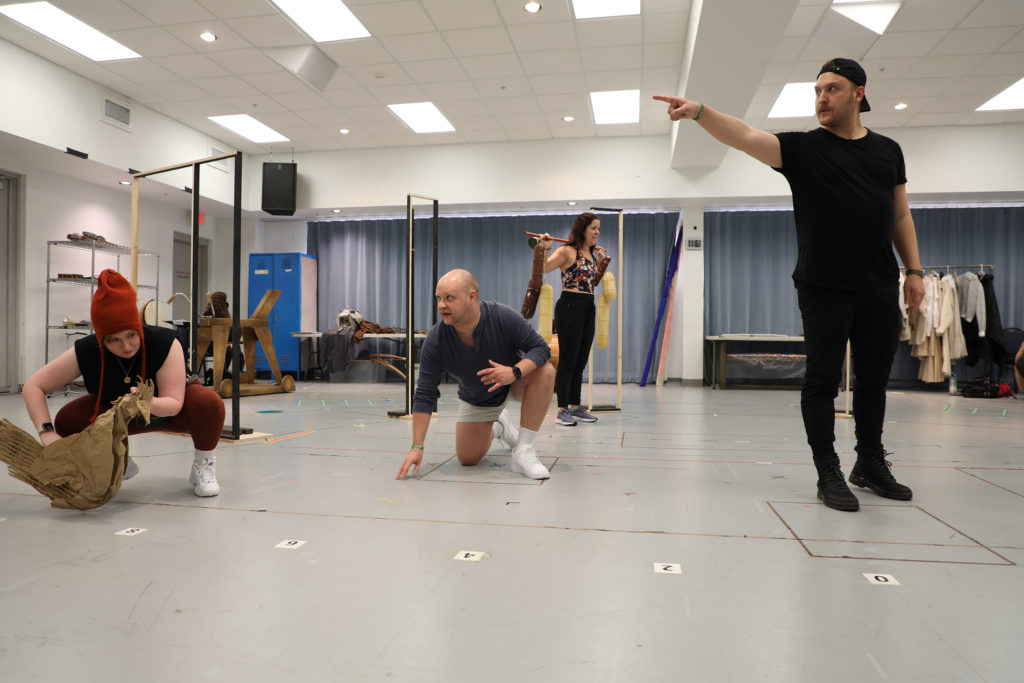
Two months before curtain, theaters closed, and Asolo Rep cancelled the rest of the season. McNally died of coronavirus complications at Sarasota Memorial Hospital on March 24, 2020.
One lockdown and two years later, Hoodis finally making it to the stage—better, Kirdahy says, for the wait and all the Zoom calls. “I think some of the storytelling is crisper. I think we’re leaning into joy. People are hungering for joy. We’ve all been through so much trauma. And a lot of the movements have changed. The show has evolved in beautiful ways.”
The Producer’s Take
Producer is one of the most difficult words to define, according to Kirdahy, since it differs from producer to producer, and in his case from production to production. On Broadway, he’s raising money, choosing material, assembling the team. “And I’m handling the press, the advertising, the marketing, all of it.” With Hood, he’s acting more as an enhancing producer, “which means that I am helping Asolo Rep realize their production to the fullest extent possible. And I have an artistic point of view. I’m also giving them money to make sure that we have the bells and whistles that we want to make the show as good as it can be.”
Kirdahy says that someone once called him “an artist whisperer”—one of his favorite compliments. A forever theater lover, Kirdahy graduated from law school intending a career in entertainment law. But then the HIV/AIDS crisis hit, turning him into an equal-time activist who provided free legal services to people with the virus. He helped his often “voiceless” clients find the words for what they “didn’t quite know how to say.” That skill set he developed as an advocate “is actually a transferable skill,” Kirdahy says.
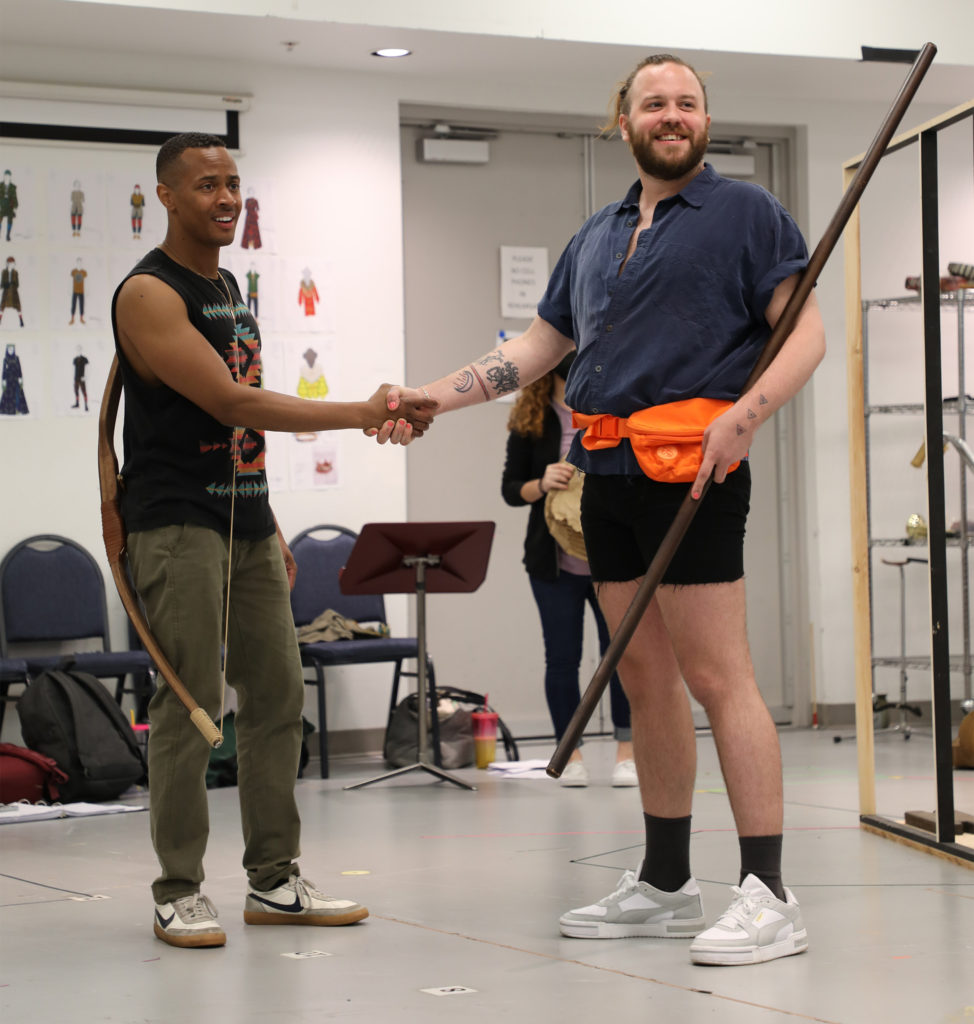
Now he coaches theater artists to “use their unique and authentic voices—not telling them what they want to say, but amplifying their voices so that they can most effectively achieve their desired ends.” Living with the gifted Terrence McNally—understanding what he thought and dreamed, how his mind and heart worked—gave Kirdahy “unique insight into the way artists think and behave,” he says. “My goal as a producer is always to create a safe space for artists so they can be their best selves.”
With Hood, Kirdahy has had a hand in everything—reconception, casting, and now rehearsals. He’ll attend every performance, too, listening for the laughs and the scuttlebutt.
He calls himself a “guest” at Asolo Rep, but a guest who’s helping design the house. He minds all the elements, from a joke that’s not landing to dialogue that sounds out of character to dark spots in the set. “Sometimes it’s talking to the book writer and saying, I think the scene is too long,orWe’re not achieving our ends. If an actor is not bringing the right color to a scene, I’ll speak to a director and say, I’m not sure that this is exactly what our authors intended.” To assist Brokaw, Kirdahy listens “to every moment of the show, beat by beat, to ensure that we’re doing the storytelling that we want to.”
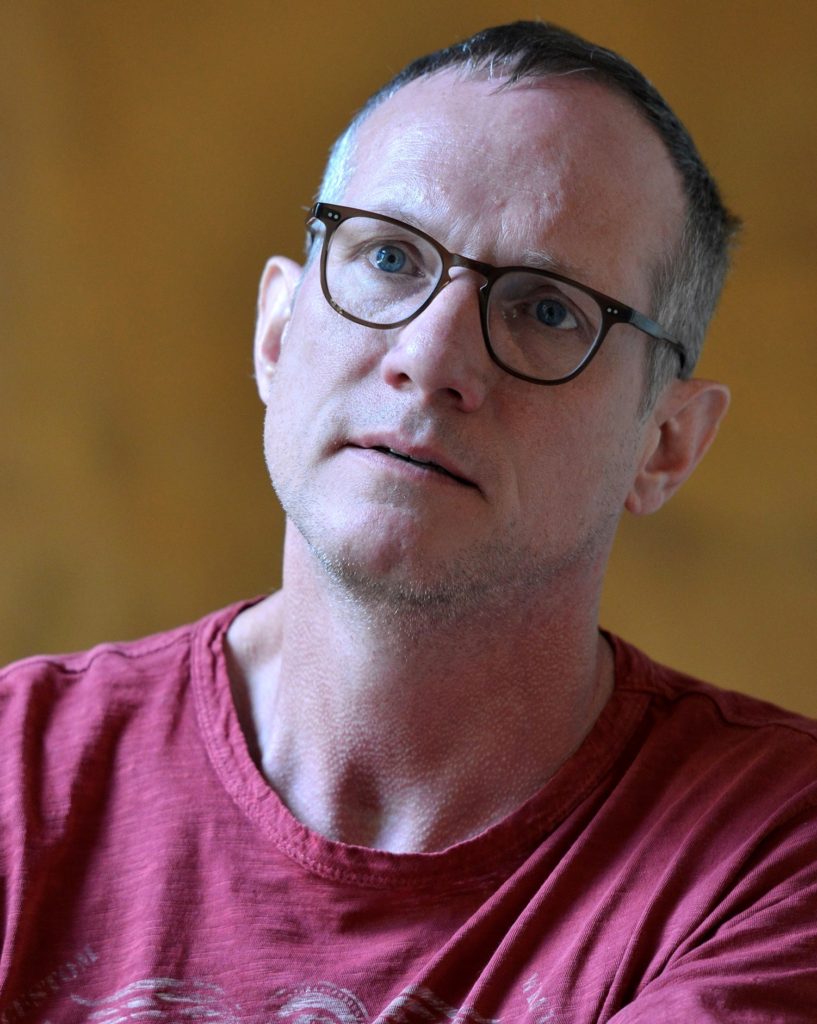
The Director’s Take
Directors turn suggestions into action. “The director is at the center of all decisions that are made,” says Brokaw. “That doesn’t mean they’re a dictator. It just means somebody has to be the nexus,” making sure “that everybody is telling the same story at the same time.” The director determines the central struggle, the heart of the story, and then serves as “information central,” making sure that everything from set design to publicity connects. The most successful productions, he says, are the most united, “where everyone is acting as part of one organism.”
What’s central to Hood, says Brokaw, “is the struggle inside all of us to find the bravery to take action when something is standing in front of us that we feel isn’t right. Everybody has a superpower inside of them. And that superpower is the ability to step forward and use your strength to make things better for those around you.”
The musical presents this challenge through the story of a company of actors. The Hoodteam “wanted to represent the diversity of the nation,” according to Brokaw, and in a pandemic twist, Zoom made it easier for lesser known actors outside of New York to answer casting calls.
“What’s been fun about this production is it has a little bit of a DIY quality to it,” says Brokaw. “We wanted it to feel like these actors have put this show together.” The twelve actors play multiple parts, so “they get to display their protean talents. Everything that happens out there is actor-generated. You never see a stagehand.” On stage they’re checking their props, running through a piece of music, chatting with someone in the audience.
A troubadour narrates the play within a play. “It is very much done with the idea that we are speaking to you, you people who are here tonight, to each of you. And we keep reminding you of that.”
Within days of opening a play on Broadway, Brokaw showed up in Sarasota for seven straight weeks of long days. But he finds working on musicals “exhilarating.” He feeds off the energy of the team, which includes a music director, choreographer, and … puppets. “You’re building a city. And this is a rather large city that we’re building with this one.”
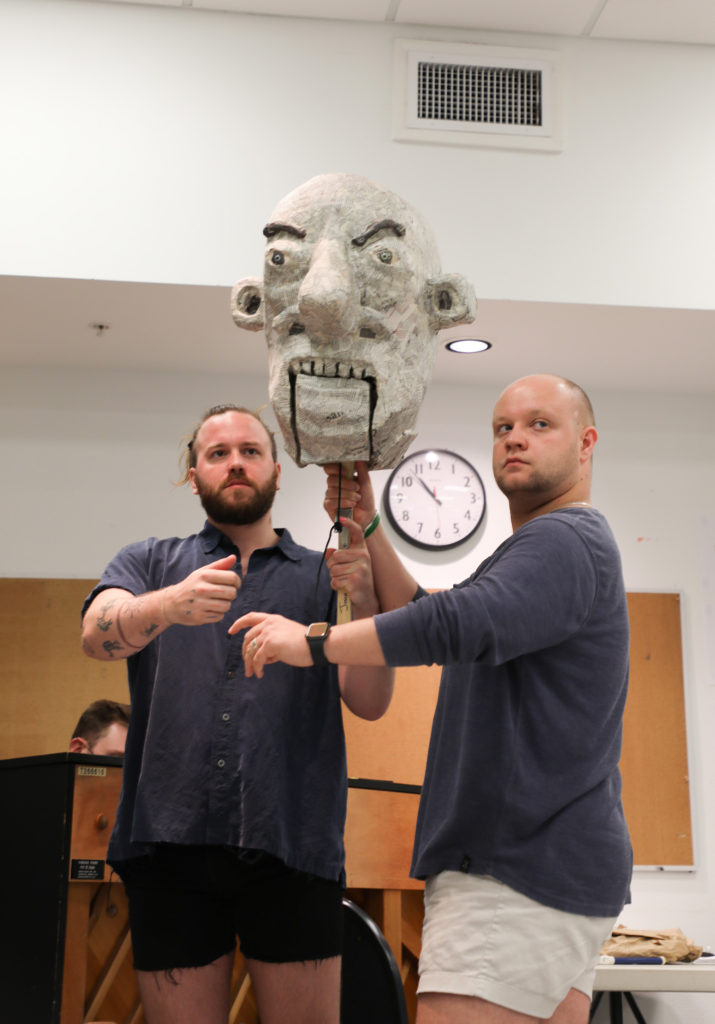
Shoutout to the Shop
Both Kirdahy and Brokaw salute their Asolo Rep collaborators, from the FSU/Asolo Conservatory student understudies to the tech crews. “The design and costume shops in particular are as good as any I’ve ever witnessed,” says Kirdahy, “and I do this work all over this country, all over the world.” He admits he can be “pretty demanding and exacting,” but “at every step of the way, I’ve been more than satisfied.”
Since the rehearsal hall shares warehouse space with the production shops, Brokaw often sneaks peeks. Sometimes he spends his lunch hour among the painters, drapers, and propmakers. “If I feel tired, I just go down to the shop, and I get excited right away because of all the drops hanging. There’s really an extraordinary group of craftspeople here,” he says.
In May, a serious problem arose with the set. It spans three levels, but the actors couldn’t play on the top one. With the clock ticking, the budget sticking, the scene shop “came up with three separate artistic solutions to the challenge that had been presented, one of which exceeded anything we ever could have hoped for,” says Kirdahy. “Not only did it solve the problem; it made it better than we had initially anticipated. That only happens when you’re working with real pros.”
As director, Brokaw works through opening night and then hands off responsibilities to the stage manager to keep the ship on course. “Our job is to make this be the best production it can be here on the stage at Asolo Rep.”
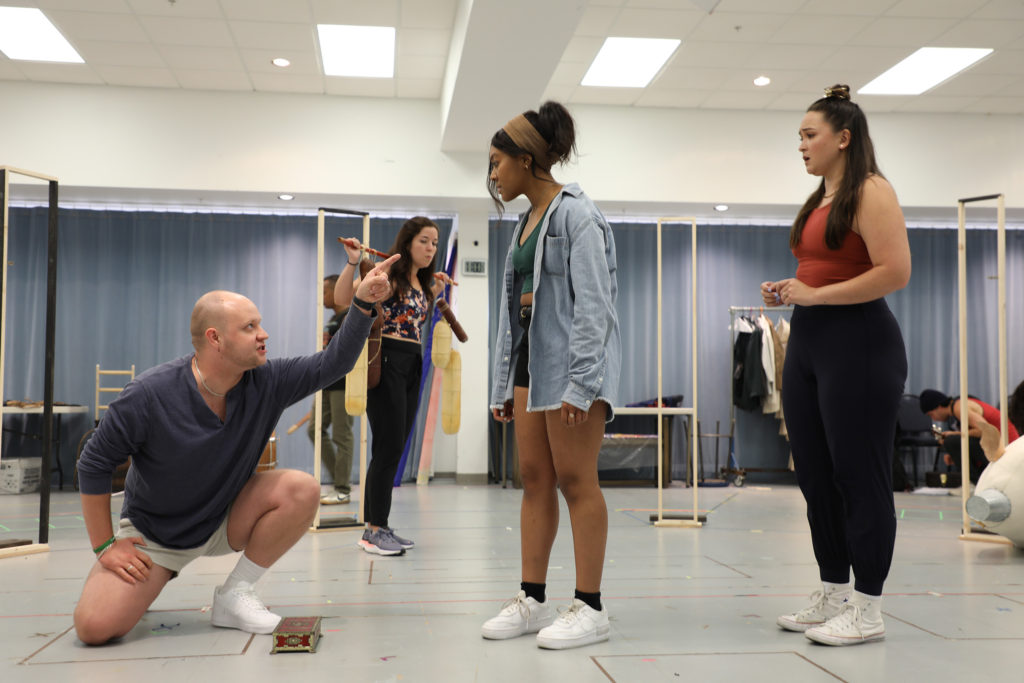
But the big guns acknowledge that Hood is also testing out its possibilities in Sarasota. Does it carry the wallop to warrant further investment? Should it move to bigger cities, perhaps with Broadway in its sights?
Undercover in the audience like some incognito king of yore, Kirdahy will be noting theatergoers’ reactions. “I like them to come as blank slates,” he says. “I can’t wait for the first performance because we’ll learn where the melodies really register with people, where the emotional moments connect.” Even though Kirdahy goes to the theatre roughly five nights a week even when he isn’t actively producing, he tries not to study up too much. “I need to rely on my nervous system to tell me what I’m experiencing, and my hope is that audiences will come in the same way.”
To book your ticket to Hood, visit www.asolorep.org or call the box office at 941.351.8000.



You must be logged in to post a comment Login